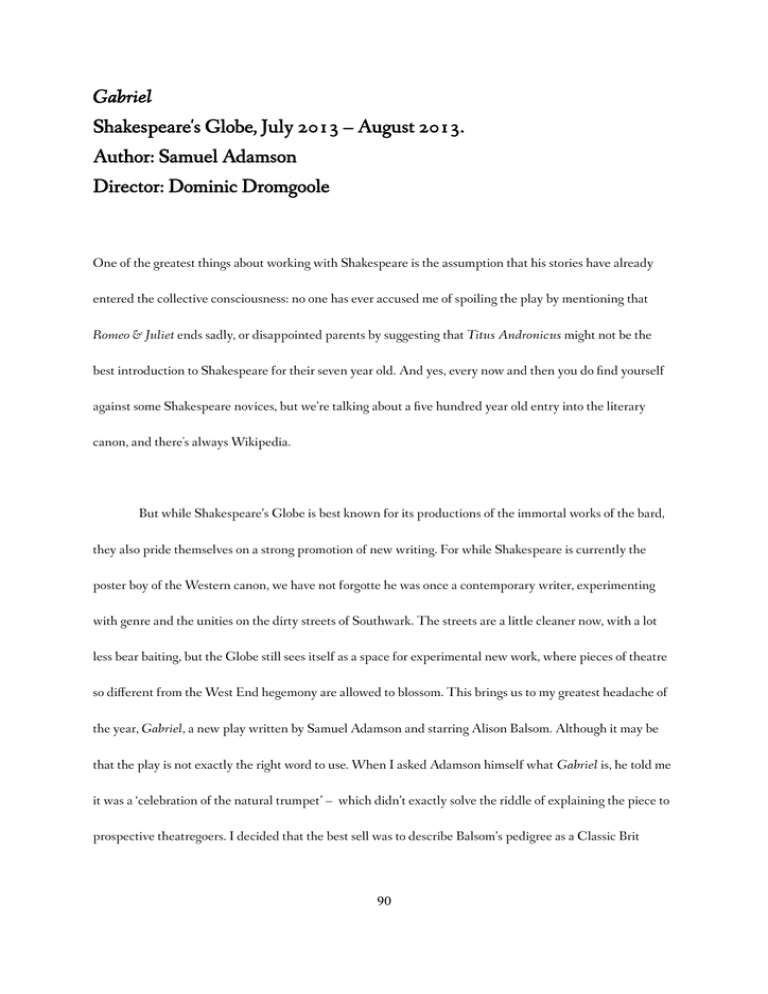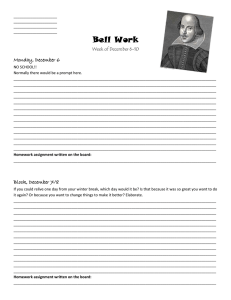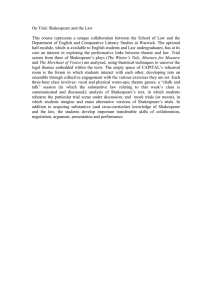Gabriel Shakespeare's Globe, July 2013 – August 2013. Author: Samuel Adamson
advertisement

Gabriel Shakespeare's Globe, July 2013 – August 2013. Author: Samuel Adamson Director: Dominic Dromgoole One of the greatest things about working with Shakespeare is the assumption that his stories have already entered the collective consciousness: no one has ever accused me of spoiling the play by mentioning that Romeo & Juliet ends sadly, or disappointed parents by suggesting that Titus Andronicus might not be the best introduction to Shakespeare for their seven year old. And yes, every now and then you do fnd yourself against some Shakespeare novices, but we’re talking about a fve hundred year old entry into the literary canon, and there's always Wikipedia. But while Shakespeare’s Globe is best known for its productions of the immortal works of the bard, they also pride themselves on a strong promotion of new writing. For while Shakespeare is currently the poster boy of the Western canon, we have not forgotte he was once a contemporary writer, experimenting with genre and the unities on the dirty streets of Southwark. The streets are a little cleaner now, with a lot less bear baiting, but the Globe still sees itself as a space for experimental new work, where pieces of theatre so diferent from the West End hegemony are allowed to blossom. This brings us to my greatest headache of the year, Gabriel, a new play written by Samuel Adamson and starring Alison Balsom. Although it may be that the play is not exactly the right word to use. When I asked Adamson himself what Gabriel is, he told me it was a ‘celebration of the natural trumpet’ – which didn’t exactly solve the riddle of explaining the piece to prospective theatregoers. I decided that the best sell was to describe Balsom’s pedigree as a Classic Brit 90 award winner. This may have been a little bit of a mistake, because although Balsom’s playing is superb, and the work of the English Concert accompanying her made me realise the true power of classical music, Gabriel is more than just well-played seventeenth century music. For one there’s a scene that features cunnilingus, which I certainly didn’t mention to any Radio Three fans who asked me what the play was about. This is where I must admit that I had preconceptions about classical music, and those who listened to it, being the domain of polite middle-class people who don’t expect to see sex acts re-enacted in a reconstructed Elizabethan theatre. And while Gabriel is lacking a traditional narrative, what it does do is illustrate that, much like Shakespeare has been swallowed up by the canon, there was a time when ‘classical’ music was contemporary and a vital response to what was happening in the city where it was written. The Globe attempts to remind us that Shakespeare was the pop culture of his day, and it does something similar with the works of Purcell in Gabriel, shaking up our ideas of what it means to enjoy classical music. And making us feel a little less guilty about laughing at fart jokes. Gabriel is best described as vignettes, with each telling a mini-story of types, all interlinked to London, peopled by characters as varied as Queen Mary and garrulous river boatmen. Henry Purcell is frequently referenced by characters, but never appears himself; instead his music does all his talking. It is his work that gives Arabella Hunt, the court singer who we are informed was once married to another woman, a voice to enchant the Queen, and his rousing birthday ode the only thing that can excite her nephew, the sickly Duke of Gloucester. Through Adamson’s writing we see this overlooked instrument illuminate a 91 forgotten period of English history, and are reminded that classical music is as vital today as it was four hundred years ago. SARAH FOSTER 92






